Zap Read online
I was driving by a high school, saw the sign advertising Grease, and said out loud, “Again?”
Like Pepsi or Coke paying to be a school’s sole soft drink, Grease and Romeo and Juliet had captured the drama departments. They and two or three other plays seemed to be in eternal rotation, like the seasons. Hadn’t anything new been written in the past thirty years that would work on the high-school stage?
I decided to take my own challenge. Not that I’d ever acted in a play. My one tryout in high school had elicited nothing more from the drama teacher than the comment “You have a low voice.” Nor had I ever written a bona fide play. I knew “Break a leg” but was vague about “downstage left.” Perhaps my innocence shows in Zap’s technical challenges. Then again, without that daring, nothing would ever get written, in any genre.
For years, I’d been collecting ideas under the heading “Multiple Genres.” Imagine the sound of pounding on Hamlet’s castle door in Denmark, the guard opens up, and there stand two girls from Sweet Valley High, who proceed to turn tragedy into comedy. Time travel had been done over and over; my idea was cross-book travel. The problem was finding an explanation. The usual solutions — time machines, doors on the past — didn’t appeal to me. Then my eye fell on the remote control. Rather than overlap genres, I could switch back and forth among them. This wasn’t fantasy; it was taking place every night across the country. All I had to do was to bring it out of the living room and onto the stage. It would suit high schools, which like huge casts. They’re also, I found, hungry for female roles. I obliged, and made the choicest role a female performance artist.
With the zapper in hand, I could stage a collision between not just two plays, but as many as an audience could keep straight. I settled on seven. Surely, I thought, one of them had to be by Shakespeare. I decided on Richard III, famed for its hunchbacked king and his final, frantic plea, “My kingdom for a horse!”— perhaps the most famous line in all of theater after “To be or not to be.”
Rather than use six other real plays, I decided to write my own, modeled on the most familiar categories — drama’s prime-time offerings. Thus, there’s a mystery set in the English countryside during World War I, strongly reminiscent of Agatha Christie. Though she’s most famous for her detective novels, she wrote plays as well, including the longest-running play of all time, The Mousetrap, in which a series of guests at an isolated inn are murdered.
I thought next of Anton Chekhov, Russia’s greatest playwright, author of The Cherry Orchard, Uncle Vanya, The Three Sisters. His brooding dramas are set in the late 1800s and peopled with once-proud families enfeebled by dreaming and scheming. Russian accents would contrast nicely with British accents. I put Chekhov in my shopping cart.
It struck me that Chekhov’s characters would have felt at home in Tennessee Williams’s plays set in the American South, plays similarly filled with vanished fortunes, twisted families, and sensitive characters who take refuge in drink and rail against the lack of culture in the countryside. Cat on a Hot Tin Roof, The Glass Menagerie, and A Streetcar Named Desire were all triumphs on the stage and later as movies. Dysfunctional southern families with a taste for liquor and eccentricity are still a staple of the stage and screen. I definitely needed a southern play.
What about comedy? The obvious model was Neil Simon, the comedy king of Broadway for decades, author of such smash hits as The Odd Couple and The Sunshine Boys. He’s the master of the wisecrack, the Woody Allen of the theater, whose plays deal with family foibles and modern life as lived in New York.
Speaking of modern, what about a play along the lines of Samuel Beckett’s Waiting for Godot, something avant-garde, full of non sequiturs, silences, and eerie situations of maddening hopelessness? The “theater of the absurd” grew out of the two world wars’ incomprehensible slaughter and the loss of faith that life made any sense. Corpses, I noticed, often figured in these plays. I decided I’d find a place for a corpse or two in mine. Last, for something truly up-to-date, I’d put in a monologue by a performance artist, one who spits on the traditions of the theater, unaware that she’s repeating its ageless themes.
Every few years, after a string of serious books, I’m ready to pack my bags and kazoo and take a vacation to comedy. Zap was my latest trip. I had a ball writing it. The question facing me when I finished was whether it would actually work.
When I heard that nearby Pacific Grove High School in California wanted to give the premiere, I was elated. Kelly Cool, the aptly named director, invited me to be part of the whole process, giving me a fabulous education along the way. The audiences were enlightening as well. Novelists never see the reader who chuckles or underlines a passage; playwrights are right in the same room. When the crowd doesn’t laugh where you wanted, you take note. When the room resounds, there’s no better place to be. Subsequent productions by James Rayfield’s students at Blake High School in Tampa, Florida, and at New York City’s Stuyvesant High School, under the guidance of Annie Thoms, nudged me farther along the learning curve. It’s been a thrill to watch the actors add inflections and gestures that weren’t on the page. Gratitude and bouquets to all three casts, several of whose inventive touches I’ve incorporated into the text.
My thanks go as well to Walter Mayes, Ron McCutchan, and Dan Gotch for the gift of their time and advice. And, as ever, a special ovation for my incomparably insightful and dedicated editor, Marc Aronson.
Zap was given its first public performance November 1, 2002, at Pacific Grove High School in Pacific Grove, California, with the following cast:
EMMALINE GRAY
Lauren Reppy
BEETON
Natalie Melendez
COLONEL HARDWICKE
Chris Deacon
MRS. MARJORIE HARDWICKE
Guin Rojek
REVEREND SMYTHE
Jessica Glen
LADY VANESSA DENSLOW
Catlin Seavey
INSPECTOR SWIFT; BUCKINGHAM
Tim Cool
CLIFFORD GRAY
Elliot Rubin
IRV WEINSTEIN
Tyler Shilstone
SAMMY
Matt Cool
AUDREY MCPHERSON
Jane Franklin
RICHARD III
Ryan Kendall
LADY ANNE; PRINCE EDWARD
Gwyneth Alldis
NORFOLK; KONSTANTIN
Michael Brusuelas
NIKOLAI VOLNIKOV
Nick Stiles
IRINA
Megan Alldis
PAVEL
Sean Muhl
OLGA
Paige Dwyer
MARSHA
Michelle Maddox
MAN
Khalid Hussein
WOMAN
Ashley Brewer
BELLBOY
Whitney VanZwol
AARON PUCKETT
Kenny Neely
REGINALD
Will Cryer
CAROLINE
Heather Seavey
LUKE
Ben Middlebrook
GRANDMAMMY
Sarah Booth-Olvera
DIRECTOR
Kelly Cool
SOUND
Dana Fleischman
LIGHTING DESIGN
Mark Stotzer
LIGHTING
Scott Rudoni
SPOTLIGHT
Patrick Cool
SET ARTIST
Margie Anderson
STAGE CREW
Katie Miller, Whitney VanZwol
THE HOUSE MANAGER
The English Mystery
EMMALINE GRAY
CLIFFORD GRAY, her husband
BEETON, their butler
COLONEL HARDWICKE
MRS. MARJORIE HARDWICKE, his wife
REVEREND SMYTHE
&nbs
p; LADY VANESSA DENSLOW
INSPECTOR SWIFT
The Comedy
IRV WEINSTEIN
SAMMY
AUDREY MCPHERSON
Shakespeare’s Richard III
Duke of Gloucester, later King Richard III
LADY ANNE, later married to Richard
Duke of BUCKINGHAM
Duke of NORFOLK
PRINCE EDWARD, Richard’s nephew
The Russian Play
NIKOLAI VOLNIKOV
IRINA, his wife
KONSTANTIN, his great-grandfather
PAVEL, his cousin
OLGA, his aunt
The Performance Art Monologue
MARSHA
The Avant-Garde Play
MAN
WOMAN
The Southern Play
AARON PUCKETT
REGINALD, his father
CAROLINE, his half sister
LUKE, his stepbrother
GRANDMAMMY
A single set is used throughout. Actors are in period costume. When switching from one play to another, a loud electronic sound is heard, followed by a brief blackout, during which the actors quickly enter and exit. The speed of these cast changes is key.
I highly recommend reading or seeing the works mentioned in the foreword or others in the genre. It’s crucial to know the conventions that are colliding. It’s just as important to remain true to them despite the growing chaos onstage. None of the laughter should be coming from the cast. The straighter it’s played, the funnier it will be.
The image of a remote control could be copied onto programs as a nod to the play’s conceit.
Making use of the following doubling possibilities reduces the cast requirements to 12 males and 8 females:
REGINALD with PAVEL
OLGA with MRS. HARDWICKE
HOUSE MANAGER with CLIFFORD GRAY and NORFOLK
INSPECTOR SWIFT with BUCKINGHAM and LUKE
AUDREY MCPHERSON with LADY ANNE and GRANDMAMMY
BEETON with PRINCE EDWARD and KONSTANTIN
The show runs roughly eighty-five minutes and should be presented without intermission.
(Before curtain rises, the HOUSE MANAGER addresses the audience.)
HOUSE MANAGER. Good evening. Thank you all for coming to tonight’s world premiere. A few preliminaries. No photographs, please, flash or otherwise. Likewise, no recording of any kind. Please check that all cell phones and pagers are turned off. Please do, however, make use of the remote controls you should have found on your seats. Vote for a change whenever you feel the need. The computer backstage will log all requests and make a switch when a sufficient threshold has been reached. Our aim is to please you, the audience. You, after all, are why we are here. To entertain you is our first and foremost duty. Why else would —
(Zap sound. Blackout. Curtain rises on a drawing room furnished in a mix of styles, from 1860 to 1960. A long couch and two chairs occupy the center of the room. There is an old black telephone atop a telephone table, a wastebasket, a bookcase, a fishbowl with goldfish, and a full whiskey bottle and set of glasses. The fishbowl and whiskey bottle must be clearly visible to the audience.)
(Lights up on the ENGLISH MYSTERY. The year is 1916, the place an estate in the English countryside. Distant thunder is heard. EMMALINE GRAY, thirty and distraught, enters scanning a guest list and stops BEETON, passing in the other direction. Actors use English accents.)
EMMALINE. Beeton — there you are. Any word from the station?
BEETON. The train is expected on time, madam. Unless the bridge at Highstoke were to be washed out.
EMMALINE. I pray it shan’t be. He only has five days’ leave. Everything must be perfect for him. You spoke to the cook?
BEETON. Yes, madam. Roast beef shall be served. And English peas.
EMMALINE. Nothing French on the menu whatsoever, does she understand?
BEETON. Yes, madam. Fear not.
EMMALINE. Nothing that might possibly remind him of the fighting. His last letter has me quite . . .
(She trails off, then looks at the guest list.)
Oh, Beeton. There’s been an addition to the guest list. I’ve invited Inspector Swift up from London. I’m hoping he’ll enthrall us with his latest case and take all our minds off this wretched war — especially Clifford’s.
BEETON. I shall see that the table is set for seven.
(He begins to leave.)
EMMALINE. Oh, and Beeton. Tell the entire staff to be on special guard against dropped pots and slammed doors and such. We must spare him loud noises of any sort.
BEETON. Certainly, madam.
(He begins to leave, getting farther this time.)
EMMALINE. And Beeton. Nothing red on the menu. Blood-red and runny. You understand.
BEETON. I shall speak to the cook about the brandied cherries, madam.
(He exits.)
EMMALINE. Oh, and Beeton —
(Zap sound. Blackout. Lights come up on the COMEDY. The time is summer, 1965, the place New York City. SAMMY, thirty, is lying on the couch and scanning the sports page, paying more attention to it than to IRV, forty-five, who’s reading aloud from the New York Times while striding about the room. Both speak with New York accents.)
IRV. (With heavy mockery.) “Never before have the traumas and textures of modern life been rendered so unforgettably.”
SAMMY. Uh-huh.
IRV. “The big, boisterous Bromberg family leaps into life off the page and takes up immediate residence in our hearts.”
SAMMY. Uh-huh.
IRV. “The author’s powers of invention astound. Equal parts comedy and tragedy, the book solves as well our foremost literary mystery — namely, when will the great American novel appear? The answer is ‘Now.’ Its name is Brooklyn Blues.”
(He looks for a reaction from SAMMY, who finally glances up.)
SAMMY. Hey, that’s great, Irv.
IRV. (Exploding.) What do you mean that’s great! It’s not my book!
SAMMY. Oh.
IRV. I mean it is mine! That’s the whole point!
SAMMY. Right. Great. And in the Times. That’s big. I mean it. Congratulations.
IRV. For what? His name’s on it!
SAMMY. But I thought you said —
IRV. Jesus, will you listen? (IRV collapses in a chair, then collects himself. Polka music sounds softly from below. IRV glares at the floor and stamps his foot, to no effect, sighs, and sits back.) Max writes novels, I write novels. It’s lonely. You’re a sportswriter — you wouldn’t know. You got forty thousand people around you at Yankee Stadium. All I’ve got is a crazy neighbor who listens to polka records. (He pounds his feet more forcefully, then finally jumps up and down on the floor. The music stops.) Maybe fifteen years ago, Max and I started having breakfast together. Once a week at Krupfeld’s, on Thirty-fifth. We’d talk writing. Should he kill off a character, should I kill my agent, that kind of stuff. When Doris walked out and I was practically living at Krupfeld’s, he let me talk it out hour after hour, for weeks. For months. Not just about Doris, but my parents, growing up, everything. That corner booth was like a couch at a shrink’s.
SAMMY. You got a couch here. And you got me to listen, just two apartments down the hall. I’m a lot cheaper than a shrink.
IRV. Probably because you wouldn’t know a cerebellum from a softball. Anyway, the last couple years, he said he had writer’s block. Fine. Said he was thinking about quitting writing. Fine. Stopped showing up at Krupfeld’s. Fine. And then, bam — Brooklyn Blues. I open it up, and it’s my family, exactly! My rabbi father, my closet atheist of a mother, my meshuggah aunts, my brothers, the neighbors. All of ’em, including me! He stole my life when I wasn’t looking! (He swats at a fly with his newspaper and misses.) So now Max McPherson is the great American author. Eating eggs Benedict at the Algonquin instead of dunking a doughnut in his coffee at Krupfeld’s. While me, I’m living on Campbell’s soup out of the can till the next piddling royalty check crawls up the sta
irs. And pouring my heart out to you, the only shrink I know who hogs the couch!
(He swats SAMMY’s feet off the couch with the newspaper.)
SAMMY. Didn’t he even change anything?
IRV. Oh, sure. Him with his “astounding powers of invention.” Instead of allergies, he gave me bladder problems — the louse. And my father, he came from Minsk instead of Pinsk.
SAMMY. Wow. Isn’t that paganism?
IRV. (Rolls his eyes.) No — and it’s not plagiarism either. That’s stealing someone’s writing, which is against the law. Stealing somebody’s actual family — that’s legal!
SAMMY. A writer’s family — man, that’s his capital. That oughta be a crime.
IRV. You’re exactly right.
SAMMY. So what are you gonna do?
IRV. I’m gonna see justice is done.
SAMMY. But you said —
IRV. Not legal justice. Legal is out. So we go to our backup. Poetic justice.
SAMMY. He wrote poems about ’em too?
IRV. Poetic justice! He stole something from me, something beyond price. Now I steal from him. Which is where you come in, Sammy.
SAMMY. Steal? Steal what?
IRV. Don’t worry. We’re not jumping through a window and running out with the color TV.
SAMMY. So?
IRV. We need something more precious than that. Something that’ll really hurt.
SAMMY. (Pause.) His typewriter?
IRV. More precious.
SAMMY. His car?
IRV. Keep going.
SAMMY. His . . . His . . . His —
IRV. (Leans toward him.) His wife. (He swats at the fly, gets it, and grins at it.) And it’s gonna be sweet.
SAMMY. Jesus, Irv. Kidnapping? You could wind up in Sing Sing.
IRV. Yeah, and I hear they’re looking for a sportswriter there to cover the knife fights. We’re not going to kidnap her, you numbskull! We’re going steal her affections. From him, to me. An eye for an eye, a theft for a theft. A betrayal for a betrayal. That’s poetic justice.

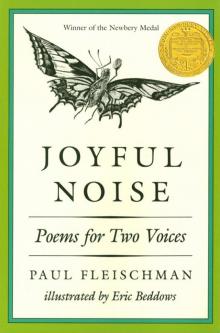 Joyful Noise
Joyful Noise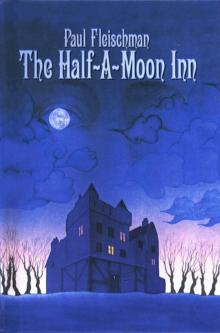 The Half-a-Moon Inn
The Half-a-Moon Inn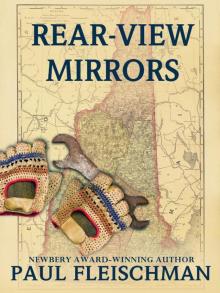 Rear-View Mirrors
Rear-View Mirrors Saturnalia
Saturnalia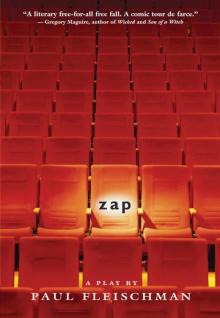 Zap
Zap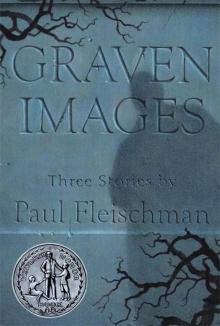 Graven Images
Graven Images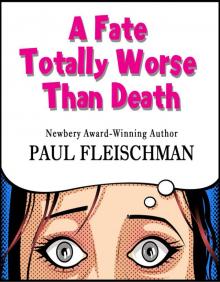 A Fate Totally Worse Than Death
A Fate Totally Worse Than Death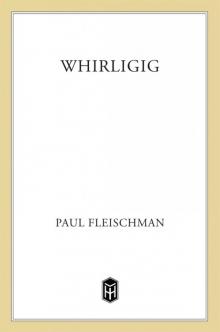 Whirligig
Whirligig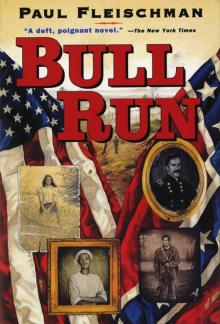 Bull Run
Bull Run